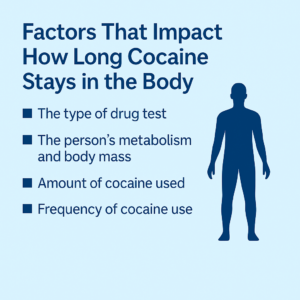How Long Does Cocaine Stay in Your System?
What Is Cocaine?
Cocaine, also known as “coke,” is a very fast-acting central nervous system stimulant .It is derived from the leaves of the coca plant, native to South America. It comes in several forms, which include:
- Cocaine hydrochloride: This is the most common form, a fine white powder that is usually snorted or dissolved in water and injected.
- Crack cocaine: This is a freebase form of cocaine that comes in rock crystal form and is typically smoked.
- Coca paste: A crude extract containing cocaine in a smokable form
What Are the Immediate Effects of Cocaine?
Cocaine produces an intense but short-lived euphoric high. The effects last for only a few minutes to an hour, depending on how it is used.1
The speed of onset of cocaine’s effects, as well as the total duration of action, is influenced by the method of use:1,2
- Snorting: Effects felt within 3-5 minutes and persist for up to 20 minutes
- Smoking: Effects felt within 5-10 seconds and persist for up to 20 minutes
- Intravenous use: Effects felt within 5-10 seconds and persist for up to 20 minutes
- Oral ingestion: Effects felt within 10-30 minutes and persist for up to 90 minutes
Injecting or smoking cocaine can cause a rush, which is then followed by a high, whereas other modes of use only cause a high.4 It is common for individuals to use cocaine over and over again in a short time period to stay high, also known as a binge.5 Binge use is often followed by an unpleasant crash.6 The crash may lead them to seek more of the drug to counter the crash. Repeated cocaine use can easily lead to an increased tolerance and even addiction.5
According to the National Survey on Drug Use and Health, about 966,000 people in the United States age 12 and older met the criteria for a cocaine use disorder—more commonly referred to as a cocaine addiction—in 2017.3
How Long is Cocaine in Your System?
 Certain factors can influence how long cocaine or its metabolites are detectable in someone’s body include:
Certain factors can influence how long cocaine or its metabolites are detectable in someone’s body include:
- The type of drug test. Blood and saliva tests typically have a short window of detection. A urine test—the most common method of testing—has a slightly wider detection period. Hair strand tests have a much wider detection window.9
- The person’s metabolism and body mass.11
- The amount of cocaine the person has used and how frequently they use cocaine.11
Anyone who is concerned about testing positive for cocaine should review the dangers of cocaine use and consider stopping use. If they find they are unable to stop using, they may have a cocaine use disorder.
Those who struggle with cocaine addiction should seek substance use treatment as soon as possible.
Does Method of Use Affect How Long Cocaine Stays in Your System?
As mentioned above, the method of use affects how quickly the drug reaches the brain. But it does not affect how long cocaine stays in a person’s system. Regardless of how it is used, cocaine and cocaine’s metabolites will show up in urine 3 to 6 hours after last use.4
How Is Cocaine Metabolized in the Body?
Cocaine is metabolized by enzymes in the liver and blood. Its main metabolite present in urine is benzoylecgonine, followed by ecgonine methyl ester.12
Benzoylecgonine can be detected in urine for up to 4 days, depending on how often someone uses, their metabolism, and the dose.12
Benzoylecgonine is the main cocaine metabolite used in drug testing because it has a urine concentration 50 to 100 times greater than the concentration of cocaine.4
Does Cocaine Stay in Your System Longer if it’s Combined With Alcohol?
Cocaine appears to be eliminated slower when it is combined with alcohol.
Using cocaine with alcohol can cause a number of problems for users:13
- Cocaine can worsen the learning deficits and impairment in psychomotor performance and driving from alcohol.
- The combination can lead to increases in heart rate.
- Using cocaine with alcohol or after drinking alcohol can lead to up to a 30% increase in cocaine levels in the blood.
- The combination can also produce a metabolite called cocaethylene, which may enhance the cardiotoxic effects of cocaine and alcohol.
Cocaine appears to be eliminated slower when it is combined with alcohol, and cocaethylene appears to be eliminated slower than cocaine:
- A study in humans found that cocaethylene seemed to be eliminated slower than cocaine.14
- Another study that used dogs found that both cocaine and cocaethylene were cleared by the body at a rate about 20% slower when they were combined with alcohol.15
- Finally, another study in rats found that repeated use of alcohol slowed the rate of cocaine elimination.16
Can Other Substances Cause You to Test Positive for Cocaine?
False positives with cocaine immunoassay urine drug screens are rare. But they can happen, and the result can cause issues for the person. In one case study, a false positive for cocaine negatively affected a patient’s pain therapy.17
If you believe you have a false positive test, follow up with the doctor or whoever ordered the test and see if they can verify the result with another type of test, such as gas chromatography/mass spectrometry or liquid chromatography/tandem mass spectrometry.14
Find Cocaine Addiction Treatment & Detox Near You
American Addiction Centers (AAC) provides expert care at our national network of drug and alcohol rehabs across the country. Our admissions navigators can help you find the right treatment. Start today by verifying your insurance coverage online, signing up for text support, or giving us a call at .
